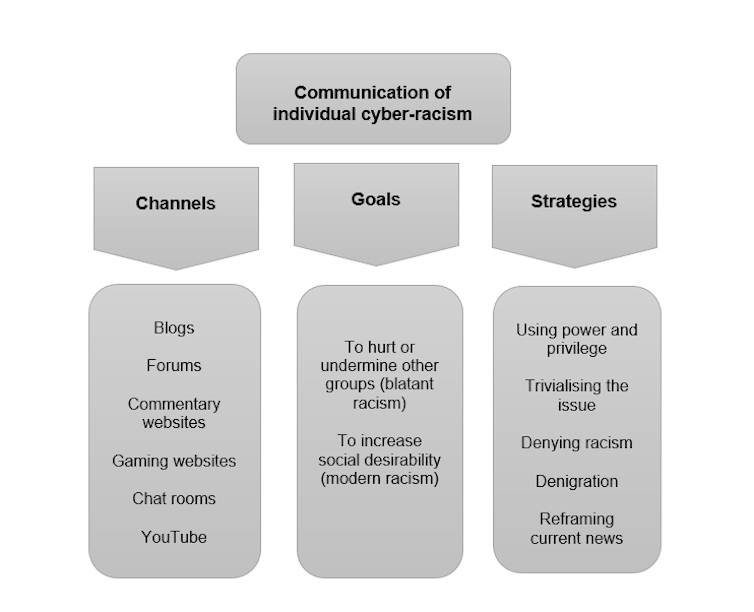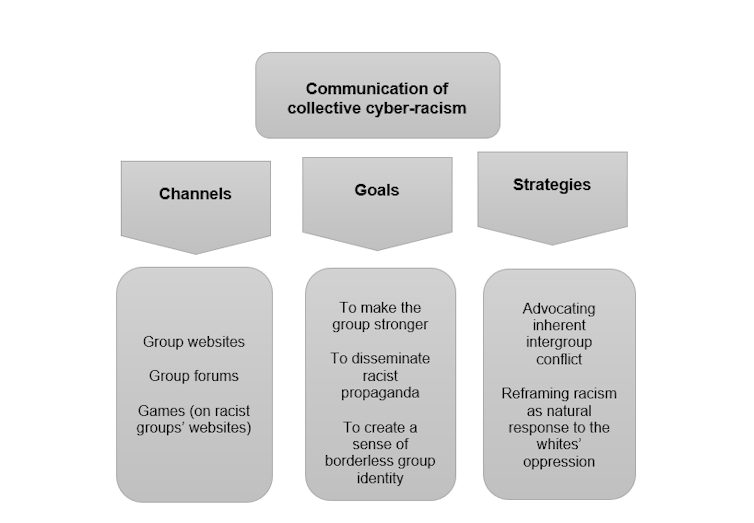
Markus Spiske/Unsplash
Ana-Maria Bliuc, Western Sydney University; Andrew Jakubowicz, University of Technology Sydney, and Kevin Dunn, Western Sydney University
Living in a networked world has many advantages. We get our news online almost as soon as it happens, we stay in touch with friends via social media, and we advance our careers through online professional networks.
But there is a darker side to the internet that sees far-right groups exploit these unique features to spread divisive ideas, racial hate and mistrust. Scholars of racism refer to this type of racist communication online as “cyber-racism”.
Even the creators of the internet are aware they may have unleashed a technology that is causing a lot of harm. Since 2017, the inventor of the World Wide Web, Tim Berners-Lee, has focused many of his comments about the dangers of manipulation of the internet around the spread of hate speech, saying that:
Humanity connected by technology on the web is functioning in a dystopian way. We have online abuse, prejudice, bias, polarisation, fake news, there are lots of ways in which it is broken.
Our team conducted a systematic review of ten years of cyber-racism research to learn how different types of communicators use the internet to spread their views.
Read more:
How the use of emoji on Islamophobic Facebook pages amplifies racism
Racists groups behave differently to individuals
We found that the internet is indeed a powerful tool used to influence and reinforce divisive ideas. And it’s not only organised racist groups that take advantage of online communication; unaffiliated individuals do it too.
But the way groups and individuals use the internet differs in several important ways. Racist groups are active on different communication channels to individuals, and they have different goals and strategies they use to achieve them. The effects of their communication are also distinctive.
Individuals mostly engage in cyber-racism to hurt others, and to confirm their racist views by connecting with like-minded people (seeking “confirmation bias”). Their preferred communication channels tend to be blogs, forums, news commentary websites, gaming environments and chat rooms.

Strategies they use include denying or minimising the issue of racism, denigrating “non-whites”, and reframing the meaning of current news stories to support their views.
Groups, on the other hand, prefer to communicate via their own websites. They are also more strategic in what they seek to achieve through online communication. They use websites to gather support for their group and their views through racist propaganda.
Racist groups manipulate information and use clever rhetoric to help build a sense of a broader “white” identity, which often goes beyond national borders. They argue that conflict between different ethnicities is unavoidable, and that what most would view as racism is in fact a natural response to the “oppression of white people”.

Read more:
How the alt-right uses milk to promote white supremacy
Collective cyber-racism has the main effect of undermining the social cohesion of modern multicultural societies. It creates division, mistrust and intergroup conflict.
Meanwhile, individual cyber-racism seems to have a more direct effect by negatively affecting the well being of targets. It also contributes to maintaining a hostile racial climate, which may further (indirectly) affect the well being of targets.
What they have in common
Despite their differences, groups and individuals both share a high level of sophistication in how they communicate racism online. Our review uncovered the disturbingly creative ways in that new technologies are exploited.
For example, racist groups make themselves attractive to young people by providing interactive games and links to music videos on their websites. And both groups and individuals are highly skilled at manipulating their public image via various narrative strategies, such as humour and the interpretation of current news to fit with their arguments.
Read more:
Race, cyberbullying and intimate partner violence
A worrying trend
Our findings suggest that if these online strategies are effective, we could see even sharper divisions in society as the mobilisation of support for racism and far-right movements spreads online.
There is also evidence that currently unaffiliated supporters of racism could derive strength through online communication. These individuals might use online channels to validate their beliefs and achieve a sense of belonging in virtual spaces where racist hosts provide an uncontested and hate-supporting community.
This is a worrying trend. We have now seen several examples of violent action perpetrated offline by isolated individuals who radicalise into white supremacist movements – for example, in the case of Anders Breivik in Norway, and more recently of Robert Gregory Bowers, who was the perpetrator of the Pittsburgh synagogue shooting.
In Australia, unlike most other liberal democracies, there are effectively no government strategies that seek to reduce this avenue for the spread of racism, despite many Australians expressing a desire that this be done.![]()
Ana-Maria Bliuc, Senior Lecturer in Social Psychology, Western Sydney University; Andrew Jakubowicz, Emeritus Professor of Sociology, University of Technology Sydney, and Kevin Dunn, Dean of the School of Social Science and Psychology, Western Sydney University
This article is republished from The Conversation under a Creative Commons license. Read the original article.

You must be logged in to post a comment.